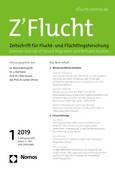Main content
Top content
Top content
Flucht- und Flüchtlingsforschung
Ausgewählte Publikationen
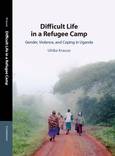
Neue Monographie von Ulrike Krause: Difficult Life in a Refugee Camp. Gender, Violence, and Coping in Uganda
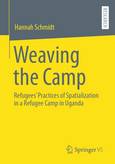
Neue Monographie von Hannah Schmidt: Weaving the Camp: Refugees' Practices of Spatialization in a Refugee Camp in Uganda
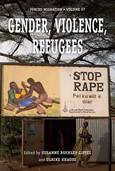
Sammelband Gender, Violence, Refugees hg. von Susanne Buckley-Zistel und Ulrike Krause 2019 als Taschenbuch erschienen
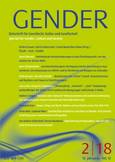
Themenheft zu Flucht - Asyl - Gender in der GENDER. Zeitschrift für Geschlecht, Kultur und Gesellschaft. Hg. von Ulrike Krause, Karin Scherschel und Carola Bauschke-Urban
Die Juniorprofessur für Flucht- und Flüchtlingsforschung im Institut für Sozialwissenschaften der Universität Osnabrück wurde von Januar 2019 bis Februar 2024 durch Prof.in Dr.in Ulrike Krause ausgefüllt.
The Junior Professorship of Forced Migration and Refugee Studies at the Institute of Social Sciences at Osnabrück University was filled by Prof. Dr. Ulrike Krause from January 2019 to February 2024.
(Deutschsprachige Erklärung unten)
Profile
The members of the Junior Professorship of Forced Migration and Refugee Studies attend to gender-reflexive examinations of conflict, displacement, and humanitarianism in research and teaching. The focus is on global politics of asylum and humanitarianism with (post)colonial legacies, the nexus of conflict, displacement and peace with gender-specific conditions and effects, agency of displaced people from intersectional perspectives, as well as research ethics and knowledge production.
The team is led by Ulrike Krause. Depending on their research focus, team members are actively involved in the Institute for Migration Studies and Intercultural Studies (IMIS), the Center for the Study of Conflict & Peace (CeCoP) as well as the Research Department of Gender Studies (FGF).
Research
The team of the Junior Professorship of Forced Migration and Refugee Studies is interested in postcolonial approaches, feminist, gender and queer theories, IR policy and norms research, agency theories, knowledge and ignorance studies, including situated knowledge.
Team members attend to diverse questions about local, regional, and global phenomena along the following focus areas:
(1) Global politics of asylum and humanitarianism with the global refugee regime and regional regimes, actors and governance processes, (post)colonial conditions and coloniality of power, global policies and norms, as well as local protection politics and humanitarian practices, incl. politics of refugee camps, production and effects of gendered categorizations.
(2) Nexus of conflict, displacement and peace with transnational entanglements, gender-specific motives for and experiences of mobilities and immobilities, conflict-related conditions during flight and in host regions, gender-based violence (incl. the continuum of violence), as well as meanings of and practices for peace.
(3) Agency of displaced people from intersectional perspectives with situated knowledge, gender-specific strategies of displaced people during flight and in host contexts, re/actions to imposed restrictions and (politicized) power relations, as well as establishment and use of refugee-led organizations as particular forms of (political) self-organizing in exile.
(4) Research ethics and knowledge production with transdisciplinarity and collaborative approaches in research together with displaced people, reflections on positionalities and (gendered) power structures in research, Do No Harm throughout the research process, research designs and qualitative methods.
The team’s regional focus range from global developments to those in African and European countries.
Research projects include:
Women, Forced Migration – and Peace? Peacebuilding Practices of Women in Refugee Camps – funded by the German Foundation for Peace Research
Global Refugee Protection and Local Refugee Engagement. Scope and Limits of the Agency of Refugee-led Community-based NGOs – funded by the Gerda Henkel Foundation
Forced Migration and Refugee Studies: Networking and Knowledge Transfer – funded by the German Federal Ministry of Education and Research (BMBF)
Teaching
Teaching of the team takes place in different study programs, including, among others, B.A. in Social Sciences, B.A. in European Studies, B.A. Double Degree in Political Sciences, B.A. Double Degree in Sociology as well as M.A. in International Migration and Intercultural Relations, European Master in Migration Studies, M.A. in Sociology, M.A. in Democratic Governance and Civil Society, and M.A. in European Governance. Seminars on the gender are also open to participants of the Interdisciplinary Certificate in Gender Studies.
Deutschsprachige Erklärung:
Profil
Das Fachgebiet der Juniorprofessur für Flucht- und Flüchtlingsforschung widmet sich in Forschung und Lehre der genderreflexiven Auseinandersetzungen mit Konflikt, Flucht und Humanitarismus. Im Mittelpunkt stehen globale Asylpolitiken und Humanitarismus mit (post)kolonialen Einflüssen, Nexus von Konflikt, Flucht und Frieden mit genderspezifischen Bedingungen und Auswirkungen, Agency von Geflüchteten aus intersektionalen Perspektiven sowie Forschungsethik und Wissensproduktion.
Das Fachgebiet wird von Ulrike Krause geleitet. Mitglieder des Fachgebiets sind je nach ihren Forschungsschwerpunkten im Forschungszentrum Institut für Migrationsforschung und Interkulturelle Studien (IMIS), im Center for the Study of Conflict & Peace (CeCoP) sowie in der Forschungsstelle Geschlechterforschung (FGF) aktiv.
Forschung
Das Team des Fachgebiets Flucht- und Flüchtlingsforschung interessiert sich für postkoloniale Ansätze, feministische, Gender- und Queer-Theorien, Policy- und Normforschung der IB, Agency-Theorien, Wissens- und Unwissenheitsforschung, inklusive situiertes Wissen.
Die Mitglieder beschäftigt sich mit unterschiedlichen Fragen über lokale, regionale und globale fluchtbezogene Phänomene entlang folgender Schwerpunktbereiche:
(1) Globale Asylpolitiken und Humanitarismus mit dem globalen Flüchtlingsschutzregime und regionalen Regimen, Akteur*innen und Governanceprozessen, (post)kolonialen Einflüssen und Kolonialität der Macht, globalen Policies und Normen sowie lokalen Schutz- und Abwehrpolitiken und humanitäre Praktiken, inkl. Politik von Lagern und Produktion vergeschlechtlichter Kategorisierungen.
(2) Nexus von Konflikt, Flucht und Frieden mit transnationalen Zusammenhängen, genderspezifische Beweggründen für und Erfahrungen von Mobilitäten und Immobilitäten, konfliktbedingten Verhältnissen im Prozess der Flucht und an Aufnahmeorten, genderbasierter Gewalt (inkl. Gewaltkontinuum) sowie Bedeutungen von und Praktiken für Frieden.
(3) Agency von Geflüchteten aus intersektionalen Perspektiven mit situiertem Wissen, genderspezifischen Bewältigungs- und Handlungsstrategien von Geflüchteten in unterschiedlichen Flucht- und Aufnahmekontexten, Umgang mit oktroyierten Restriktionen und (politisierten) Machtverhältnissen sowie Schaffung und Nutzung von ‚refugee-led organizations‘ als spezifische Formen von (politischer) Selbstorganisierung im Exil.
(4) Forschungsethik und Wissensproduktion mit Transdisziplinarität und kollaborativen Ansätzen der Forschung gemeinsam mit Geflüchteten, Reflexionen von Positionalitäten und (vergeschlechtlichten) Machtstrukturen in der Forschung, ‚Do No Harm‘ im gesamten Forschungsprozess, Forschungsdesigns und qualitativen Methoden.
Regionale Forschungsschwerpunkte der Mitglieder des Fachgebiets liegen auf globalen Entwicklungen und jenen in afrikanischen und europäischen Ländern.
Forschungsvorhaben sind u.a.:
Frauen, Flucht – und Frieden? Friedensfördernde Praktiken von Frauen in Flüchtlingslagern – gefördert von der Deutsche Stiftung Friedensforschung
Global Refugee Protection and Local Refugee Engagement. Scope and Limits of the Agency of Refugee-led Community-based NGOs – gefördert von der Gerda Henkel Stiftung
Flucht- und Flüchtlingsforschung: Vernetzung und Transfer – gefördert von dem Bundesministerium für Bildung und Forschung (BMBF)
Lehre
Lehrveranstaltungen des Teams des Fachgebiets Flucht- und Flüchtlingsforschung finden u.a. im B.A. Sozialwissenschaften, B.A. Europäische Studien, Zweifachbachelor Politikwissenschaft, Zweifachbachelor Soziologie sowie im M.A. Internationale Migration und Interkulturelle Beziehungen (IMIB), European Master in Migration Studies (EuMIGS), M.A. Soziologie, M.A. Demokratisches Regieren und Zivilgesellschaft und M.A. Europäisches Regieren statt. Veranstaltungen mit Bezug zu Geschlecht sind zudem geöffnet für das interdisziplinäre Zertifikat Geschlechterforschung.

